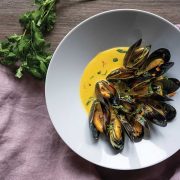
We tend to think of stress as a modern malady, but you’d better believe that the pharaohs of ancient Egypt and the emperors of Rome suffered their fair share of anxious moments.* The herbs ancient civilizations used to soothe stress can still benefit us today in #thesetryingtimes—especially the 10 botanical beauties listed here.
Many of us are newly discovering the power of herbal medicines (that’s 2020 for you), but archeological excavations show that humans have been using plants for medicinal purposes for 60,000 years. The oldest surviving written record of medicinal plant use dates from 1500 BC in Egypt. Sophisticated systems of medical treatment developed centuries ago, such as traditional Chinese medicine and Ayurveda, are still widely used today and are largely based on botanicals.
Infusion
Boiling water is poured over dried flowers, fruit, leaves, and other plant parts to make a tea. Cold infusions may also be made.
Decoction
Plant materials, including the bark, rhizomes, roots, or other woody parts, are boiled in water to make a tea. A decoction is generally more potent than an infusion.
Tincture
Herbs are soaked in a dark place in glycerin, alcohol, or vinegar for two to six weeks, and then the tincture is strained from the plant material. Note that glycerin can come from animal or plant sources.
Essential oil
A highly concentrated aromatic volatile oil extracted from the leaves, stems, flowers, and other parts of a plant. Essential oils are usually diluted before use.
Herbal infused oil
Volatile oils are extracted from plants by soaking the plants in a carrier oil for approximately two weeks and then straining the oil before use.
Cream
Herbs are mixed in a water-based preparation to make a cream, which allows for absorption from the surface of the skin.
Salve
A salve is an ointment made from a heated mixture of oil and wax; it lasts longer on the skin than a water-based cream.






